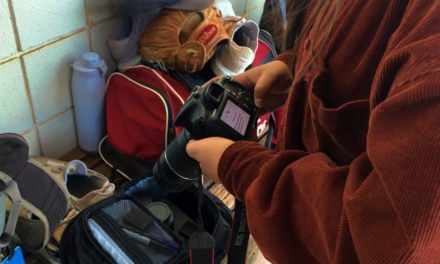My College Experience
I’ve been a student of Gulf Coast State College since 2012, I was only starting part-time because my family and I have no idea how the college system works. On 2014, I’ve finally started college life full-time and I’ve been learning new things as I go.
I’ve also noticed new changes as the years roll by, such as the change of LMS from Angel to Canvas, and the split of most classes into sub-classes. Changes like these are always normal, but many can be confused and require explanation. That’s okay, it happens to many students, and even faculty members.
During my 4-6 years here in Gulf Coast State College, I’ve learned substantial lessons on tackling classes and time schedules. It may not be high school, however, it can be challenging to much of the uninitiated. As the years go on, I’ve seen the intensity, but also provides room for improvement whenever I made a mistake on my end. I have made many mistakes over the years, and I’ve grown wiser from learning my faults. So, to prevent newcomers from leaving college early because of its difficulty or stress, I’d like to discuss my own Code of Ethics on starting college.
Ask For Help/Questions
Everyone’s out to help each other to relieve the stress and confusion when it comes to homework, class schedules, Canvas in general, etc. Every professor has office hours and they’re more than eager to help you out. Just look at the provided syllabus on what time are they available if you have any lingering inquiries.
Plan Your Schedule Ahead
If you’re starting out college, don’t expect it to be like high school. Everyone’s class schedule’s different depending on what classes they’ve registered for the semester, and everyone has their own time schedule on when and where to arrive for class. When registering for classes on Lighthouse, write your schedule out; this includes the class time, days of availability, name of professor, course number, and location.
If you’re anxious on what the class will be like, visit the professors ahead of time and they’ll be sure to explain much of how the class is going to go throughout the semester. First day of college can be intimidating, but once it’s all assured between you and the professor, you’ll be in the clear.
Don’t Procrastinate
This is a habit that’s been the bane of my existence for an extremely long time. If you have major projects due and you believe that you have enough time, don’t believe it for a second. The moment that thought sinks in, you’re doomed to rush your project at the last second.
The best strategy to prevent procrastination is doing the project in short sections, do a bit of it each day. Muster up the motivation to do it little by little until you have enough courage to finish it days before the deadline. Always take action ahead of time and never later to the last minute. If you have trouble understanding the project, always ask your professor! They will help you no matter what, so don’t hesitate to ask.
Do Research
You’ve been provided with textbooks required to assist you in class throughout the semester, but there will be times when neither the book or Canvas provide information you need to complete an assignment. None of the chapters you’ve read has anything noteworthy. The modules on Canvas doesn’t provide any templates or any insightful statistics. What’s the next possible option? Research online!
The internet’s abundant of references and information guaranteed in helping your assignment. Best sites to look in are those with domain names like .org, .edu, .info, and/or .gov. Wikipedia’s quite debatable, but over the years it has grown to be a resourceful sight for references as long it’s given appropriate citations, and they also provide links to more legitimate sources for your assignment, so take what you will.
Asking your professor’s another great option as they’re the most informative on the assignment and where on your textbook you’ve unintentionally missed. They made the assignment, so it’s best to rely on them first before you look on the internet for assistance.
Textbook Loopholes
Every class has its own textbook that are “essential” for the semester, but under unfortunate circumstances, some can be overpriced. Some can be around $100, or sometimes they can be about over $150! Many are willing to expect this, but this is outrageous. And to add salt to injury, you’re either short on funds or not willing to spend that much on a textbook. There are a few loopholes that you can exploit, so let’s go through them.
Compare Textbook Prices
First one is to write down the price of the textbook you found in the college bookstore, and compare it to the same exact textbook found online. Amazon has a variety of textbooks for many students that are looking for cheap, used books just to get through the semester.
Rent Textbooks
Next will be renting textbooks. Of course, there are chances that your bookstore will offer rentals for a certain amount of days. Another great source of textbook rentals would be Amazon, which will offer about 3-4 months of rentals, and it comes at a lower cost than the initial purchase price.
Go Textbook-less
Finally, there’s going to class textbook-less. This should be a final resort if the two options above doesn’t do any favors, but it’s also a risky move. This also only works if the textbook’s not needed at all in class, for example; your syllabus tells you to get a book on storyboarding, but throughout the semester, the professor has never brought out the book as a compatible source of information as the students themselves are able to understand without it. If you bought the book and never use it, then that’s college money down the drain.
There is a hidden option when going textbook-less, you can always ask a friend or classmate to make paper copies of the required chapter. There are times when the professor utilizes powerpoints during lecture, and they mostly uploads them on Canvas for reference. You can use those powerpoints for future tests and exams.
So before you consider any of the three options, go to your first or second day of class and observe on how often will the class use the textbook. If the professor pays no mind to it, don’t buy or rent the book. If it’s used constantly, then consider the following options.
Take Notes
During lectures, always take notes on what you’ll be expecting for any future pop quizzes, tests, or exams. Find any form of valuable information on Canvas or from the presented lectures as they will help you significantly. Never, I repeat, never sleep through it! These lectures are imperative to your grade.
Conclusion
These are what I’ve learned during my 4-6 years in Gulf Coast State College. Consider them as my Code of Ethics, or my personal College Survival Guide, whichever you prefer. It has taken me a while, but this should provide enough insightful information to prepare many new college students to come.
For those that has read through my Code of Ethics and feel prepared, I would take another step further and be extra cautious. Good luck to you and to your future endeavors.
ABOUT THE AUTHOR
Michael Lopez
Student Author - April 2018








